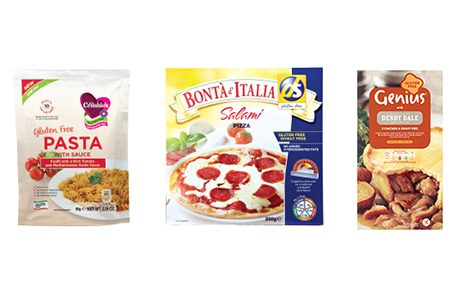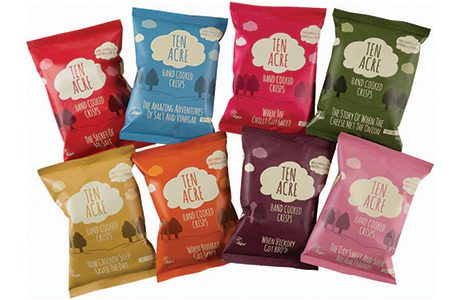There are more free-from products available than ever before. But, to make the most of a booming market, what should c-stores stock? And how should they display free-from?
SOMETIMES, less is more. ‘Free-from’ foods are typically defined as products that are free from one of the five key allergens: gluten, wheat, dairy, soya and nut. But allergy-sufferers aren’t the only people buying free-from any more.
Research from Mintel shows the UK free-from category doubled in size between 2009 and 2014 and now has an estimated value of £365m. The number of gluten-free launches – as a proportion of total food and drink launches in the UK – grew by 6% to 11.8% between 2012 and January to October 2014.
And even with an avalanche of new products on the market, 30% of those who buy or eat free-from say they would like to see a wider range of every day essentials.

The figures, sourced from Mintel’s Free From Foods Report UK – November 2014 are being highlighted at the Free From Foods/Ingredients 2015 international trade show this month in Barcelona.
Ronald Holman, the exhibition’s director, said: “The free-from market has come such a long way in just five years in the UK. The research shows that increases in avoidance are partly being driven by so-called ‘lifestylers’ – those who are opting to go free-from as a lifestyle choice.”
One company aiming to build on that trend is specialist supplier Genius, which has launched a new digital advertising campaign to promote the physical benefits of gluten-free bread to people who haven’t tried it.
Running this month, the digital campaign includes a mixture of VOD spots across 4OD and ITV Player, YouTube and Facebook, and is designed to reach an audience of consumers considering a move to a gluten-free diet.
“Free-from really started to accelerate from 2009 onwards. One of the key reasons for that was an injection of products which really raised the quality offering to the consumer,” said commercial director Dave Shaw.
“Consumers that have to eat gluten-free for health reasons are buying them more frequently. But outside of that, a huge number of people are buying into the category as a positive lifestyle choice.
“And what we’re seeing is that the major retailers in the UK have started to expand their offering in their c-stores.”
He said it was very important for smaller independent retailers, looking to compete against the multiples, to make the best use of the space in their stores.

“Because so many different kinds of individuals are coming into this category, there are lots of different things being tried or experienced across the retail trade, but it’s important to know, wherever you choose to stock the product, which are the best-selling products that are going to work the hardest,” he said.
Shaw advised stocking Genius seeded, brown and white loaves, but said the company is also seeing growth in the frozen category, with products like Genius gluten-free pies.
The growth of emerging sectors such as frozen and chilled in gluten-free is faster than other more staple sectors, according to Dr Schar UK, owner of DS-Gluten Free.
“A smaller convenience store should ensure that it carries a few gluten-free staples, including bread, crackers and biscuits,” said commercial director Bradley Grimshaw.
“Larger convenience stores should consider introducing frozen gluten-free meal solutions. With clear signposting, a loyal consumer base will soon be built when people become aware of the quick and easy mealtime options available. Frozen products such as the DS-Gluten Free Chicken Kiev and Bonta d’Italia pizzas are perfect options for simple and filling weekday dinners.”
NPD at Delicious Alchemy is currently focused on on-the go gluten-free options, which the company says is a key growth area right now, along with frozen.
“Giving consumers more choice when it comes to genuinely tasty gluten-free food, whether you’re baking at home or grabbing something on your lunch hour, is vital,” said founder Emma Killilea.
“While there is an argument for putting items in the main aisle to increase sales from those who don’t necessarily have food intolerances but are following a certain lifestyle, as someone with a severe food allergy and coeliac disease, my view is that free-from products should remain in a bespoke free-from area.
“It is very discouraging having to walk down aisles full of food you cannot eat. The free-from aisle is great because I can look at anything new that has come on the market, safe in the knowledge I can have most of it.
“Adjacent products shouldn’t contain any potential contaminants – fresh bread near gluten-free items would be a clear product pairing to avoid, for example.”
However, at Yumsh Snacks, owners of Ten Acre, CEO Tony Goodman reckons free-from foods will continue to move into the mainstream.
“Ten Acre crisps and popcorn are gluten, dairy and MSG-free, vegan and vegetarian. We tick all the boxes, so stockists only need stock one brand,” he said.
“We are finding that free-from products are moving away from specialist aisles and more into mainstream as awareness of the category grows. Yet Ten Acre can already sit happily on both as a great tasting, premium product – which just happens to be free-from too.”





















